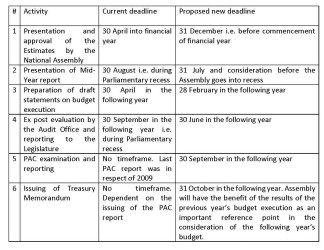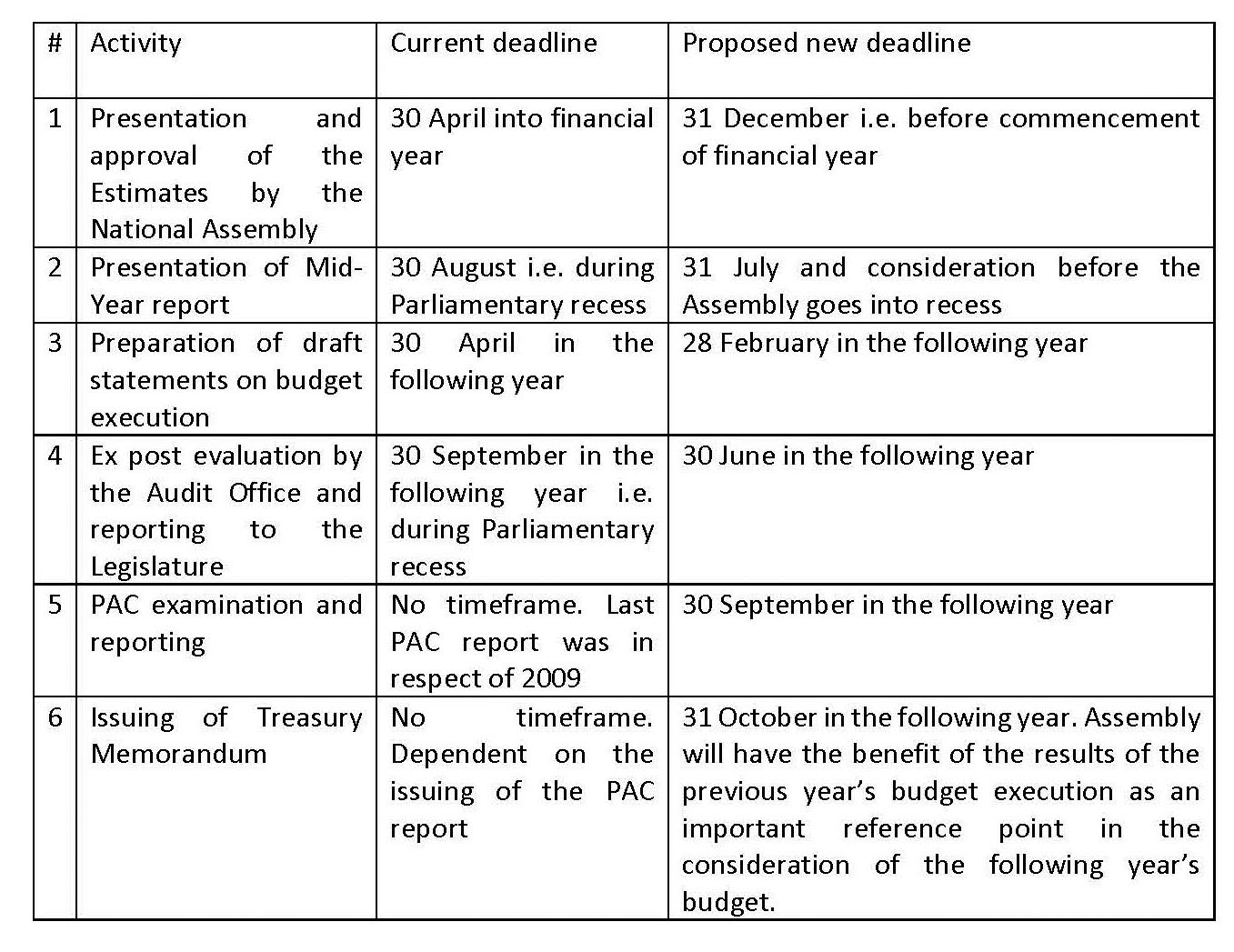Last week, we discussed the Government’s decision to pay over all proceeds from the Lotto funds to the Consolidated Fund. We felt that it is a victory for public accountability ending almost 20 years of struggle to get the previous Administration to agree that these proceeds are public revenues which have to be paid over to the Consolidated Fund and that no public expenditure can be incurred without parliamentary approval. The then Administration fought tooth and nail to retain the proceeds which were kept in a special bank account under the control of the then Office of the President to be used at its discretion. One recalls the unsolicited opinion of a former Attorney General to the Auditor General in support of the Government’s position in an attempt to cower him into silence. This column is on record as having considered the opinion seriously flawed.
The long-awaited Estimates of Revenue and Expenditure for 2015 will be presented to the National Assembly at 2.00 p.m. today, some four months after the constitutional deadline. This delay was occasioned by the dissolution of Parliament on 28th February, one month before the Estimates were due to be presented. As a result, the affairs of the State had to be managed for eight months without an approved budget, and the Government had to rely on provisions of Article 219 (3) of the Constitution to access funds to meet the cost of essential government services. In particular, no new capital expenditure projects could have been undertaken, and no new measures could have been put in place to stimulate the economy that has so far been adversely affected by the stalemate over budgetary allocations for the last three years.
The Administration has until 10 September 2015 to present the budget. The budget is in effect a four month one since eight months would have already elapsed, and revenues for this period would have already been collected and paid over to the Consolidated Fund; and expenditure, albeit very restricted, would have already incurred using the special constitutional provisions referred to in the previous paragraph. Nevertheless, the early presentation of the Estimates is most welcome.
 It is also good that the Administration has found time to discuss the budgetary proposals with the political Opposition, and one hopes that this will continue to be a regular and sustained feature for years to come, notwithstanding the unfortunate experiences of the 10th Parliament. The budget debate is likely to last for the rest of the month and possibly into the new month. One also hopes that the debate will be a healthy one, free of rancour, ill-will, name-calling, and unnecessary shouting and heckling that were a regular feature of previous budget debates. Our new Speaker must ensure that the highest forum of the land is not in any way desecrated by these undesirable practices but is accorded the utmost respect befitting of its status; and the debate does not degenerate into what former Attorney General Doodnauth Singh (now deceased) once described as a “fish market” scene.
It is also good that the Administration has found time to discuss the budgetary proposals with the political Opposition, and one hopes that this will continue to be a regular and sustained feature for years to come, notwithstanding the unfortunate experiences of the 10th Parliament. The budget debate is likely to last for the rest of the month and possibly into the new month. One also hopes that the debate will be a healthy one, free of rancour, ill-will, name-calling, and unnecessary shouting and heckling that were a regular feature of previous budget debates. Our new Speaker must ensure that the highest forum of the land is not in any way desecrated by these undesirable practices but is accorded the utmost respect befitting of its status; and the debate does not degenerate into what former Attorney General Doodnauth Singh (now deceased) once described as a “fish market” scene.
In addition, it is important for the debate to be broadcast live on television so that citizens can observe first hand our elected representatives at work in the furtherance of the national interest, as opposed to narrow partisan political interest. At the end of the debate, political maturity, goodwill and compromise should dictate that appropriate adjustments to the Estimates be made to the extent that there is merit in doing so. After all, this is the main purpose of the debate. If this happens, it will be a welcome and progressive development that will augur well for the future.
Need for advancing the timetable on budgetary matters
The Constitution allows for a maximum of 90 days into the financial year for the preparation of the Estimates for that year. While the Minister of Finance has indicated that the 2016 Budget will be presented much earlier, it would be highly desirable for future budgets to be presented to and approved by the Assembly before the financial year begins. This will assist budget agencies to plan the execution of their activities more efficiently and effectively, especially as regards procurement planning. The United Nations prepares a biennial budget, and before the biennium ends, the General Assembly approves the budget for the new biennium, even it means extending its session into the wee hours of 31 December.
Under the present arrangements, there is a tendency for the acceleration of expenditure in the last quarter of the year in an attempt to exhaust budget allocations, considering that all appropriations lapse on 31 December. These arrangement provide a fertile ground for all sorts of irregularities to take place, including the manipulation of cut-off procedures; the failure to refund unspent balances to the Consolidated Fund; advance payments being made for the supply of goods/services and the execution of works without ensuring that value is received before the financial year closes; over-payment to suppliers and contractors; defective works being executed; and in some cases the transfer of unspent balances into special bank accounts to be used in the following year.
Article 219 (1) of the Constitution provides for the Minister to authorise withdrawals from the Consolidated Fund “for the purpose of meeting expenditure necessary to carry on the services of the Government of Guyana until the expiration of four months from the beginning of the financial year” or the coming into effect of the Appropriation Act, whichever is earlier. We have seen how this provision was manipulated over the last three years that caused unauthorized expenditure totalling $4.544 billion to be incurred in 2014. This column has consistently advocated the advancing of the entire accountability timeframe from: budget preparation, presentation and approval by the Assembly; budget execution and mid-year reporting; end-of-year reporting and ex post evaluation by the Audit Office; Public Accounts Committee (PAC) examination and reporting; to the issuing on the Treasury Memorandum that sets out what actions the Government has taken or proposes to take in relation to the findings and recommendations of the Auditor General and the PAC. The following revised deadlines, which do not require any changes to legislation or constitutional amendments, should be given serious consideration, as Parliamentarians gather today to consider the Estimates for 2015:

Some other comments
The new Administration needed time to settle in and to consider a new sense of direction in terms of governance, transparency and accountability, consistent with its manifesto in general, and its 100-day action plan in particular. It has been over 23 years since the majority partner in the coalition had not been in office. Times have changed, and the Administration has to be careful in adopting the practices of the pre-1992 era, particularly prior to 1985.
Mistakes will be made. However, there must be a sincere acknowledgement when these are brought to attention, and appropriate corrective action taken. In this regard, the words of former US Ambassador James Michel uttered at a Miami conference in 1991 are still relevant.
Our Democracy here in the United States over the last two centuries has weathered the storms of war, economic depression, crime, drugs, corruption and scandal. It survives because we make our mistakes openly, we learn from them and we correct them openly. Our government and its officials are politically, financially and legally accountable.
There have been a number of criticisms so far. The first relates to the number of Ministries and by extension the number of Ministers. Various authoritative studies in the past have indicated that, given the size of Guyana’s population and its economy as well as demographic considerations, an appropriate governance structure revolves around 12-14 Ministries. The Administration has done some re-organisation of Ministries and has come up with 15 Ministries which is slightly above the recommended structure. Those studies were done several years ago and would have been overtaken by the passage of time. Therefore, any criticism of the number of Ministries would be considered unjustified. There are now 26 Ministers, 12 of whom are Ministers within their respective Ministries. The President has explained the rationale for the appointment of these Junior Ministers as an arrangement whereby they are considered shadow Ministers who are understudying their superiors in the hope of becoming full-fledged Ministers at some future point in time. They are in effect Parliamentary Secretaries.
Second, the selection of national awardees appeared to have been done with much haste in order for the announcement to be made on Independence Day. It was not carefully thought out so as to avoid the mistakes of the past Administration in relation to these awards. The system provides for a National Awards Committee to be set up under the chairmanship of the Chancellor of the Judiciary. Public announcements are required to be made well in advance of the selection, requesting the nomination of persons for national awards. Civil society organisations are also to be written to in this regard. After several rounds of deliberations, the Committee then comes up with a recommended list of persons for the various categories of awards and maintains adequate records in support of its recommendation. This list is presented to the President who, in his own deliberate judgement, may include other persons. However, these procedures appeared to have been overlooked, resulting in much criticisms when the announcement was made.
The third criticism relates to the appointment of Ministers to the membership of State boards. Statutory bodies and other entities in which controlling interest vests in the State are created to provide them with a reasonable degree of autonomy and flexibility to manage their affairs free of Ministerial and political influence. The subject Minister sets policies, and these are executed by the management of the organization with oversight by a Board of Directors appointed by the Minister or by Cabinet. It follows that Ministers ought not to be members of State boards. The situation is compounded by the fact that some Ministers are chairpersons of these boards. When this happens, an important aspect of checks and balances is lost in that the Minister as chairperson of a board reports to himself/herself as the subject Minister!






